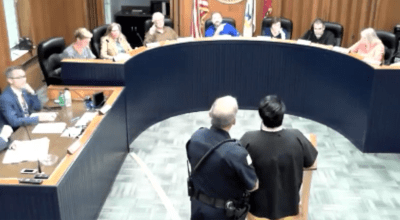
A federal appellate court this week served up a legal victory for a U.S. Marine Corps veteran who sued the Hamilton County law enforcers who detained him on the side of the road without cause for nearly an hour in a fruitless search for marijuana.
By Jamie Satterfield / Tennessee Lookout

The 6th Circuit U.S. Court of Appeals is refusing to grant former Hamilton County Sheriff’s Office Deputies Daniel Wilkey and current Deputy Tyler McRae immunity from a civil-rights lawsuit Soddy Daisy, Tenn., resident William Eugene Klaver filed against them in an April 2019 traffic stop.
Klaver is representing himself and is relying heavily in the case on the officers’ camera footage and his own, court records show.
A three-judge panel of the appellate court said in this week’s opinion that Klaver has presented ample evidence the pair of law enforcers intentionally dragged out a stop for a window tint violation as a ruse to search Klaver’s vehicle for marijuana — without legal cause.
“When the historical facts are taken in the light most favorable to Klaver, we agree with (U.S. District Judge Travis McDonough) that the deputies violated clearly established Fourth Amendment law,” the opinion stated. “So a jury must decide how to view these historical facts.”
Wilkey was arrested months after his encounter with Klaver on charges including rape, assault and official oppression, crimes prosecutors say he committed while on duty and used his police power to carry out. He resigned in December 2019.

Wilkey and McRae are named as defendants in at least a half dozen federal civil-rights lawsuits, alleging abuses of power and brutality in encounters with citizens. The most high-profile of those cases involves a traffic stop of Shanda Riley in which the duo “baptized” her in a creek in 2019. Riley, 42, died of a drug overdose earlier this year.
“When the historical facts are taken in the light most favorable to (plaintiff) Klaver, we agree with (U.S. District Judge Travis McDonough) that the deputies violated clearly established Fourth Amendment law,” the 6th Circuit Court of Appeals opinion stated.
After Wilkey’s arrest, McRae was transferred to work as a school resource officer at East Ridge High School. He’s since been accused of roughing up an East Ridge student without cause. Video of the September encounter between McRae and the student went viral. McRae has since transferred back to patrol.

‘Nervous and shaky’
Wilkey and McRae claimed they had the right to be suspicious of Klaver in April 2019 because he seemed “nervous” and “shaky” after being stopped for window tint that appeared too dark, court records showed.
Klaver countered he had cause to be nervous and shaky, records stated. He’d heard about rumors of police brutality and abuse of power by “some Wileys” in law enforcement and has tremors as a sufferer of muscular dystrophy.
As Klaver reached for his driver’s license, Wiley “inquired about where Klaver was headed,” the 6th Circuit opinion recounted. Klaver didn’t answer.
“Not going to talk to me?” Wiley asked Klaver, who held his silence.
When Wilkey pressed with another question, Klaver handed Wilkey his license and asked, “Am I being detained?”
“Wilkey replied, ‘Yes,’ because of the window-tint violation,” the opinion stated. “As Wilkey and McRae headed back to Wilkey’s cruiser, Wilkey said the words ‘sovereign citizen’ to McRae. The officers talked for a few minutes.
“Wilkey observed that the van had an ‘obstruction,’ a Marine Corps sticker, on its license plate and noted that Klaver had been ‘shaking like a leaf, too,’” the opinion continued.

The pair decided to summon a drug-sniffing dog to the scene. They didn’t tell Klaver, though.
“About five minutes into the stop, the officers returned to Klaver’s van and requested his registration and insurance card,” the opinion stated. “Wilkey expressed appreciation for his military service but added that Klaver could not have an obstruction on his license plate.”
Wilkey began questioning Klaver, asking if he’d ever been arrested or took medication, the opinion stated. Klaver answered no to both questions.
“Wilkey explained that the ‘reason I’m asking is (because) you’re shaking,’ and he inquired whether Klaver had ‘Parkinson’s or anything like that,’” the opinion stated. “Klaver indicated that he did not think that Wilkey could ask him these questions.
“Wilkey justified his questioning on the ground that Klaver’s shaking might suggest that he was ‘hiding something’ or had ‘drugs,’ so Wilkey asked, ‘You don’t have any of that, do you?’” the opinion continued. “Klaver responded, ‘No, I don’t.’
This 20-page legal notice lets you fight back vs. illicit ‘traffic stops’ — sue for damages, have defense in your criminal case
http://s6.voscast.com:7162/stream David show live 7A, repeating 6P weekdays
No drugs found
That didn’t stop Wilkey. According to the opinion, he continued to press Klaver on whether he had drugs or guns in his van. Klaver again answered, “No.” Wilkey then asked Klaver for permission to search the van.
Klaver refused.
“Klaver responded as anticipated,” the opinion stated. “(He said,) ‘I refuse permission for you to search my vehicle’ and ‘there’s nothing in here.’ For a third time, Wilkey asked Klaver if he had ever been arrested, and Klaver again replied, ‘No.’ Wilkey reiterated: ‘Is there any reason why you’re shaking so bad?’
“Klaver replied, ‘Sir, I’m trying to be as respectful as I can, but you’ve got me illegally pulled over,’” the opinion recounted.
Wilkey walked away from the van, and McRae walked up. By now, Klaver was videoing his interactions with the pair.
“Caught on Klaver’s video, McRae asked Klaver if he had served in the Marines,” the opinion stated. “After nodding yes, Klaver noted that, while he did not mean to be disrespectful, he would not ‘answer any more questions.’ Klaver instead said that he would like to be ‘on my way’ if they were not arresting him.”
According to the opinion, McRae defended the continued detention of Klaver, saying Wilkey penned two traffic citations against Klaver for excessive window tint and obstructing his license plate with his Marine Corps sticker. McRae eventually walked away.
Nearly 30 minutes after Wilkey first stopped Klaver, the drug-sniffing dog arrived with his handler.
“(Wilkey) told this officer that Klaver was likely a ‘sovereign citizen’ who was ‘being combative’ and ‘trying to conceal himself,’” the opinion stated. “Wilkey added that the canine officer should let him ‘finish’ with the ticket before deploying the dog in case Klaver ‘does something stupid.’”
The canine handler waited another 10 minutes before taking the dog around Klaver’s van. McRae insisted the dog had “alerted” to the presence of drugs in the van. He and Wilkey searched Klaver’s van but found nothing illegal inside it.
“The (U.S.) Supreme Court has adopted a ‘bright-line’ rule that officers may not detain a driver for longer than necessary to complete a traffic stop simply because they want to investigate other crimes,” the 6th Circuit panel wrote. “Under Klaver’s view of the facts here, Wilkey and McRae did just that.”


Here is another false arrest/imprisonment case that the innocent victim could have easily brought against the criminal deputies. This false imprisonment went for an hour and might have saved lives if the two deputies were put into the prison cages they belong in, instead of being allowed to terrorize the people of the county for living their peaceful lives.
And, who knows, if these criminals had been prosecuted as they should be by responsible citizens, perhaps Hamilton County could have a real Sheriff (office of the People), for a change.
After instantly suffering false arrest and imprisonment, it takes 3 years and justice has yet to be served.